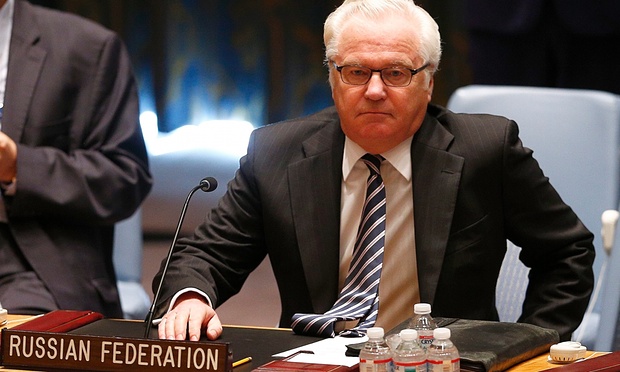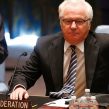
Russia Vetoes UN Draft Resolution on MH17 Tribunal
Publication: Eurasia Daily Monitor Volume: 12 Issue: 143
By:

Moscow vetoed a United Nations Security Council (UNSC) draft resolution that would have set up an international tribunal to investigate and prosecute those involved in the downing passenger airliner of Malaysia Airlines Flight 17. The Boeing 777 jet was shot down on July 17, 2014, in the eastern Ukrainian region of Donbas, over territory controlled by Russia-backed separatists. All 298 passengers and crew were killed, two-thirds of them Dutch. Russia’s ambassador to the UN, Vitaly Churkin, dismissed as “unacceptable” the draft resolution on the tribunal put forward by Malaysia, Ukraine, Australia, the Netherlands and Belgium. Australian Foreign Minister Julie Bishop arrived in New York City to attend the UNSC meeting, expressing confidence Russia may be convinced not to veto. Dutch Prime Minister Mark Rutte phoned President Vladimir Putin hours before the vote in an apparent last-ditch attempt to sway the Kremlin to abstain and allow the tribunal, but failed. According to the Kremlin, Putin described the tribunal proposal as “unwarranted” and questioned the impartiality of the investigation conducted by the Dutch authorities in cooperation with Malaysia, Australia, Belgium and Ukraine (Moskovsky Komsomolets, July 29).
Eleven countries on the 15-member UNSC voted in favor; Russia’s long-time partners China, Angola and Venezuela abstained; and Russia, in isolation, cast its veto. Bishop, Malaysia’s Transport Minister Liow Tiong Lai, and Ukrainian Foreign Minister Pavlo Klimkin expressed disappointment the draft resolution was vetoed and promised to continue to seek justice and punish the guilty. According to Liow, the failure to establish an international tribunal sent a “dangerous message of impunity to the perpetrator of this heinous crime.” Churkin, in turn, literally yelled at Klimkin. While expressing his condolences to the families of the Flight MH17 crash victims, Churkin complained that Russian officials were not full partners in the investigation. According to Churkin, establishing a UN tribunal would be “premature,” and the impartiality of its findings could not be guaranteed (Moskovsky Komsomolets, July 29).
Ukraine and Western governments have accused the pro-Russia separatist rebels of shooting Flight MH17 out of the sky with a surface-to-air BUK M1 missile (known in the West as the SA-11 “Gadfly”), fired from separatist-controlled territory and possibly provided by Russia or made operational with Russian technical assistance. Ukrainian authorities have been actively promoting the creation of an international tribunal to punish the guilty. The Donbas rebels have denied any involvement, and Moscow, in turn, has been accusing the Ukrainian military of shooting down Flight MH17 using a surface-to-air missile or a rocket fired from a military jet (see EDM, July 16).
Ukrainian President Petro Poroshenko and members of his cabinet have insisted that the use of a veto by Russia in the UN would be tantamount to a public admission of guilt—that the Kremlin is not only shielding its guilty Donbas vassals but also de facto acknowledging itself as a perpetrator. According to Russian state-controlled Channel One TV anchor Vladimir Pozner, with the UNSC vote on the proposed Flight MH17 tribunal, Russia found itself between a rock and a hard place: “Anti-Russian sentiment in the West is so prominent today, Russia would surely be blamed. I understand Putin being against an international tribunal because he believes it would prejudge the rebels that Russia armed and then declare Russia guilty.” At the same time, according to Pozner, a Russian UN veto would be “inevitably” seen internationally as a tacit acknowledgment of guilt: “In international public opinion we lose no matter what” (Interfax, July 29).
The Russian ambassador in Malaysia, Valery Yermolov, in a statement made in Kuala Lumpur, lambasted the proposed international tribunal as a “kangaroo court” (the English equivalent of the Russian term “sudilishe”) intended to “incriminate and isolate Russia and to serve the specific interests of some nations” (Interfax, July 29). At the same time, according to a recent poll by independent pollster Levada-Tsentr, some 47 percent of Russians would want an international tribunal to investigate the MH17 disaster, with 19 percent against and 34 percent undecided. Granted, only 2 percent of Russians believe Moscow or the rebels in Donbas were involved in the destruction of Flight MH17: 47 percent blame the Ukrainian military, 41 percent believe the authorities in Kiev are the culprits, and 17 percent directly blame the United States. The Russian state TV propaganda machine is highly effective: A majority of Russians consider the Ukrainians and Americans as villains and believe an international tribunal would put Poroshenko and his US masters in the dock. Russian propaganda failed to convince the public as to why the tribunal idea is “wrong”—that it could indict the Kremlin instead of Poroshenko (Vedomosti, July 26).
The Kremlin reacted swiftly. Putin’s press secretary Dmitry Peskov told reporters why Russia used its UNSC veto: “Russia wants an impartial investigation that would name the culprits and will oppose attempts to politicize the investigation and use it as a pretext to organize a political ‘sudilishe’ or kangaroo court.” Peskov once again questioned the impartiality of the Dutch-led investigation, accusing it of being nontransparent. According to Peskov, “after a proper investigation is concluded, legal experts may discuss the proper form of any future litigation” (RIA Novosti, July 30).
The pro-Kremlin mass-circulation daily Komsomolskaya Pravda accused the US of instigating a deliberately falsified international tribunal, because its policy of isolating Russia is failing and many European countries want to dismantle sanctions Washington has forced upon them. To reinforce the sanctions regime, the US wants to falsely indict Russia in the murder of innocent Flight MH17 passengers and crew. The daily also lambasted Internet postings by unnamed “liberal Russians” who disagreed with the use of the UN veto to stop the proposed tribunal (Komsomolskaya Pravda, July 30).
International isolation does not seem to be altering Kremlin policies. Putin’s regime has too many skeletons stuffed in all of the Kremlin’s closets to allow itself to give in or significantly compromise on any major issue. Any small concession could destabilize the entire heap of propaganda falsehoods and the ensuing avalanche may engulf the entire regime. Moscow will almost certainly continue to be in total denial of any culpability in the Flight MH17 disaster, will refuse to accept any investigation findings that say otherwise, and will oppose any impartial tribunal it cannot veto. In Russia’s past, similar stands of total denial taken by the Kremlin over a significant international issue, like, say, the secret protocols of the August 1939 Molotov-Ribbentrop pact, eroded only after a radical regime change in Moscow. Western leaders simply phoning Putin will not have much of an impact.




